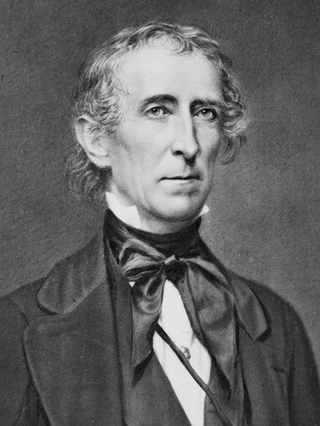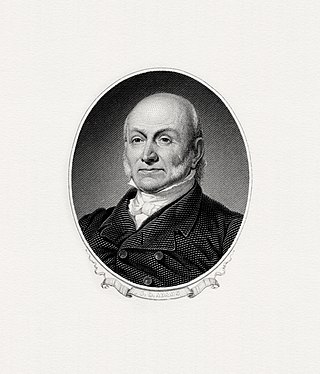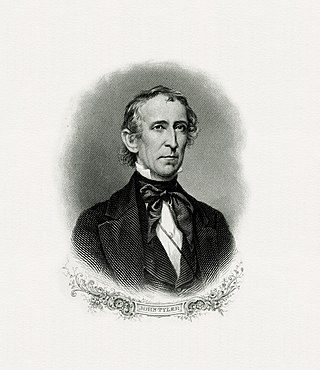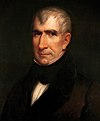
Martin Van Buren was an American lawyer, diplomat, and statesman who served as the eighth president of the United States from 1837 to 1841. A primary founder of the Democratic Party, he served as New York's attorney general and U.S. senator, then briefly as the ninth governor of New York before joining Andrew Jackson's administration as the tenth United States secretary of state, minister to Great Britain, and ultimately the eighth vice president from 1833 to 1837, after being elected on Jackson's ticket in 1832. Van Buren won the presidency in 1836 against divided Whig opponents. Van Buren lost re-election in 1840, and failed to win the Democratic nomination in 1844. Later in his life, Van Buren emerged as an elder statesman and an anti-slavery leader who led the Free Soil Party ticket in the 1848 presidential election.

William Henry Harrison was an American military officer and politician who served as the ninth president of the United States from March 4 to April 4, 1841, the shortest presidency in U.S. history. He was also the first U.S. president to die in office, causing a brief constitutional crisis since presidential succession was not then fully defined in the U.S. Constitution. Harrison was the last president born as a British subject in the Thirteen Colonies and was the paternal grandfather of Benjamin Harrison, the 23rd U.S. president.

The 1836 United States presidential election was the 13th quadrennial presidential election, held from Thursday, November 3 to Wednesday, December 7, 1836. In the third consecutive election victory for the Democratic Party, incumbent Vice President Martin Van Buren defeated four candidates fielded by the nascent Whig Party.

The 1840 United States presidential election was the 14th quadrennial presidential election, held from Friday, October 30 to Wednesday, December 2, 1840. Economic recovery from the Panic of 1837 was incomplete, and Whig nominee William Henry Harrison defeated incumbent President Martin Van Buren of the Democratic Party. The election marked the first of two Whig victories in presidential elections, but was the only one where they won a majority of the popular vote. This was the third rematch in American history, which would not occur again until 1892.

Between 73 and 79 days after the presidential election, the president-elect of the United States is inaugurated as president by taking the presidential oath of office. The inauguration takes place for each new presidential term, even if the president is continuing in office for a second term.
The Gold Spoon Oration, also called "The Regal Splendor of the President's Palace," was a political speech given in the US House of Representatives by Charles Ogle (Whig-PA) on April 14–16, 1840. The speech reviled then-President Martin Van Buren for his supposedly luxurious lifestyle in the White House, while idealizing Whig presidential candidate William Henry Harrison as a homespun man of the people; compare the idiom "silver spoon".

The presidency of Martin Van Buren began on March 4, 1837, when Martin Van Buren was inaugurated as President of the United States, and ended on March 4, 1841. Van Buren, the incumbent vice president and chosen successor of President Andrew Jackson, took office as the eighth United States president after defeating multiple Whig Party candidates in the 1836 presidential election. A member of the Democratic Party, Van Buren's presidency ended following his defeat by Whig candidate William Henry Harrison in the 1840 presidential election.

The presidency of John Tyler began on April 4, 1841, when John Tyler became President of the United States upon the death of President William Henry Harrison, and ended on March 4, 1845. He had been Vice President of the United States for only 31 days when he assumed the presidency. The tenth United States president, he was the first to succeed to the office intra-term without being elected to it. To forestall constitutional uncertainty, Tyler took the presidential oath of office on April 6, assumed full presidential powers, and served out the balance of Harrison's four-year term, a precedent that would govern future extraordinary successions and eventually become codified in the Twenty-fifth Amendment.

John Tyler was an American politician and lawyer who served as the tenth president of the United States from 1841 to 1845, after briefly holding office as the tenth vice president in 1841. He was elected vice president on the 1840 Whig ticket with President William Henry Harrison, succeeding to the presidency following Harrison's death 31 days after assuming office. Tyler was a stalwart supporter and advocate of states' rights, including regarding slavery, and he adopted nationalistic policies as president only when they did not infringe on the states' powers. His unexpected rise to the presidency posed a threat to the presidential ambitions of Henry Clay and other Whig politicians and left Tyler estranged from both of the nation's major political parties at the time.

The inauguration of George H. W. Bush as the 41st president of the United States was held on Friday, January 20, 1989, at the West Front of the United States Capitol in Washington, D.C. This was the 51st inauguration and marked the commencement of the only term of both George H. W. Bush as president and Dan Quayle as vice president. Chief Justice William Rehnquist administered the presidential oath of office to Bush and Justice Sandra Day O'Connor administered the vice presidential oath of office to Quayle. Bush was the first sitting vice president to be inaugurated as president since Martin Van Buren in 1837 and the last World War II combat veteran. Bush composed his own prayer for the ceremony which he recited at the start of his inaugural address; the last president to do so was Dwight D. Eisenhower at his first inauguration in 1953.

The inauguration of Jimmy Carter as the 39th president of the United States was held on Thursday, January 20, 1977, at the East Portico of the United States Capitol in Washington D.C. This was the 48th inauguration and marked the commencement of Jimmy Carter's and Walter Mondale's single term as president and vice president. Chief Justice Warren E. Burger administered the presidential oath of office to Carter, and Speaker of the House Tip O'Neill administered the vice presidential oath of office to Mondale. This was the last inauguration held on the East Portico of the Capitol building as well as the last time the chief justice would stand to the left of the podium, with the audience facing them, while swearing in a president. Exactly forty years later, Carter attended the inauguration of Donald Trump, becoming the first U.S. president to mark the 40th anniversary of his inauguration.

The inauguration of William Howard Taft as the 27th president of the United States was held on Thursday, March 4, 1909, at the Senate chamber inside the United States Capitol, Washington, D.C., instead of the regular East Portico due to a blizzard. This was the 31st inauguration and marked the commencement of William Howard Taft's only term as president and James S. Sherman's only term as vice president.

The inauguration of John Quincy Adams as the sixth president of the United States took place on Friday, March 4, 1825, in the House Chamber of the U.S. Capitol in Washington, D.C. The inauguration marked the commencement of the only four-year term of John Quincy Adams as president and the first term of John C. Calhoun as vice president. Adams was the first president to have been the son of a former president–John Adams; and Calhoun, at age 42 on Inauguration Day, was the second-youngest vice president.

The second inauguration of Andrew Jackson as president of the United States took place in the House Chamber of the U.S. Capitol on Monday, March 4, 1833. The inauguration marked the commencement of the second four-year term of Andrew Jackson as president and the only four-year term of Martin Van Buren as vice president.

The inauguration of Martin Van Buren as the eighth president of the United States took place on Saturday, March 4, 1837, at the East Portico of the United States Capitol in Washington, D.C. This was the 13th inauguration and marked the commencement of the only four-year term of both Martin Van Buren as president and Richard Mentor Johnson as vice president. Vice President and President-elect Van Buren rode with his predecessor Andrew Jackson in a small phaeton built from the wood of USS Constitution drawn by four gray horses. This was the first time that the outgoing and incoming president rode together to the Capitol. Van Buren would become the last sitting vice president to be inaugurated as president through an election until George H. W. Bush in 1989.

The inauguration of John Tyler, the tenth president of the United States, was held on Tuesday, April 6, 1841 at the Brown's Indian Queen Hotel in Washington, D.C. following the death of President William Henry Harrison two days earlier.

The inauguration of Benjamin Harrison as the 23rd president of the United States took place on Monday, March 4, 1889, at the East Portico of the United States Capitol in Washington, D.C. This was the 26th inauguration and marked the commencement of the only four-year term of Benjamin Harrison as president and Levi P. Morton as vice president. Chief Justice Melville Fuller administered the presidential oath of office as rain poured down.

The 1840 United States elections elected the members of the 27th United States Congress, taking place during the Second Party System. In the aftermath of the Panic of 1837, the Whigs become the fourth party in history to win control of the presidency and both houses of Congress; the Whigs would never again accomplish this feat. The election also marked the first time since the 1834 elections that the Democratic Party did not control the presidency and both chambers of Congress.

In 1840, William Henry Harrison was elected President of the United States. Harrison, who had served as a general and as United States Senator from Ohio, defeated the incumbent president, Democrat Martin Van Buren, in a campaign that broke new ground in American politics. Among other firsts, Harrison's victory was the first time the Whig Party won a presidential election. A month after taking office, Harrison died and his running mate John Tyler served the remainder of his term, but broke from the Whig agenda, and was expelled from the party.


















